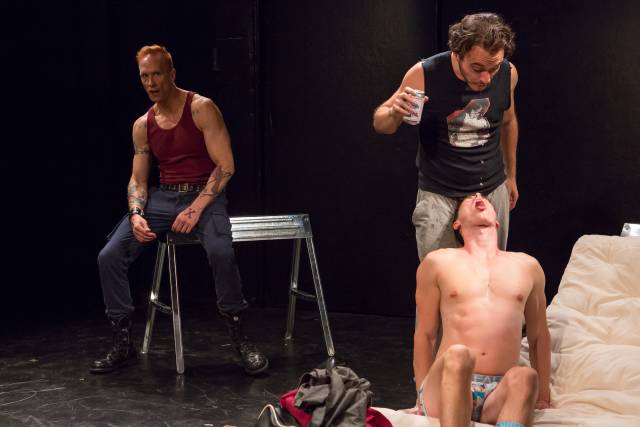

The main characters in The Jamb are addicted to something, for man-child Tuffer (Nic Grelli), it’s drugs, alcohol and sex-infused binges that do the trick, for his best friend Roderick (J. Stephen Brantley) it’s trying to fix Tuffer. When we first meet them, Roderick has arrived at Tuffer’s apartment in the middle of the night, or very well into the morning actually, after his friend reported an intruder, who turns out to be his new twenty-something boy-toy, a perfectly chiseled college student called Brandon (Todd Flaherty).
As the disappointed Roderick condemns Tuffer’s behavior, Brandon prances carelessly, his nonchalant behavior silently accusing the middle aged men of behaving like infants. This encourages Roderick’s wrath, and suddenly we find ourselves in a play about the problems of middle aged white men, who were fortunate to survive the AIDS crisis, but were somehow left feeling empty inside. They weren’t the courageous Stonewall generation, nor the younger one which gets to enjoy the privilege of legal equality and high school LGBTQ groups.
One certainly understands Roderick’s frustration, he’s all rage and tattoos after all, and by default the play’s, since it was written by Brantley. What’s difficult to empathize with is just how angry it is and for how long. It’s clear from the beginning that Brandon is a character we’re supposed to see with contempt, the play never villainizes him, but it doesn’t do him any favors either, he’s seen as vapid and cold, but by the end of the play he turns out to be the most rational character, the one who in his silence has spoken the most.
The play is directed with flair by David Drake who makes a great use of flashbacks and uses musical cues to perfection, but The Jamb doesn’t really have much to say, it often feels like an unfinished work that started out with a great thesis but then descended into rom-com. A refreshing change of air in the second act (although the show certainly could’ve done without an intermission) makes the play more enjoyable, but considering how much of the time is spent by the characters condemning pleasure, one can’t help but feel guilty for having this feeling. Roderick certainly wouldn’t approve.